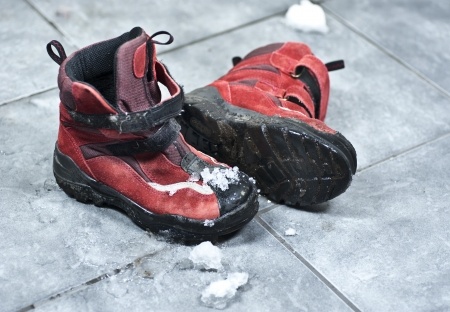 Many of us pay special attention to our feet and toes during the summer, as we find ourselves wearing sandals or going barefoot outdoors. Knowledgeable podiatrists and wound care specialist Dr. Reza Mobarak, DPM, FACFAS, FAPWCA of DFW Wound Care Center in Plano, Lewisville and Irving warns his patients against neglecting their feet in the winter.
Many of us pay special attention to our feet and toes during the summer, as we find ourselves wearing sandals or going barefoot outdoors. Knowledgeable podiatrists and wound care specialist Dr. Reza Mobarak, DPM, FACFAS, FAPWCA of DFW Wound Care Center in Plano, Lewisville and Irving warns his patients against neglecting their feet in the winter.
Even if your feet seem hidden away in thick socks, sturdy boots or comfy slippers, they can be quite susceptible to blisters or other irritations during the coldest months of the year. Here are just a few reasons why winter wound care should never be “out of sight, out of mind.”
1. Damp Feet Can Cause Skin Irritation, Fungal Growth
When you have to walk outdoors through rain, sleet, ice or snow, the natural solution is to protect your feet with sturdy hiking boots, galoshes or loose pull-on boots lined with sheepskin or fake fur. Inside the cozy boots, your feet may feel warm but they may not necessarily be dry. Outside moisture can seep into your shoes easily.
Plus, your feet may sweat onto socks or boot linings, which then never quite completely dry out between wearings. Your podiatrist knows that dark, moist areas easily cultivate bacteria that cause fungal infections, rub blisters on skin, and creep into minor cuts or abrasions to cause infection.
Dry, itchy skin, cracking or peeling, and thick yellow toenails are just a few symptoms of foot fungus. Your wound care doctor may recommend topical anti-fungal ointment or oral medications. The best defense is to inspect feet and the inside of your boots constantly, with the aim of keeping both as dry and clean as possible. Wear acrylic fiber socks rather than cotton, and change socks at least once daily. Treat feet with antiperspirant to reduce sweating, and don’t wear the same shoes every day. This gives shoes or boots time to dry out between uses.
2. Warm Boots Worsen Foot Odor
Embarrassing foot odor may result from a condition called bromhydrosis – simply put, sweaty feet. Your foot is covered in more than 250,000 sweat glands capable of producing over a pint of perspiration daily. The odor, however, stems from bacteria mixed in with the sweat. Bacteria exists everywhere, naturally, so the best defense against foot odor is keeping the feet dry.
Put powder in your socks, which should be clean and breathable fabric. Nylon or polyester hosiery or leggings tend to promote more sweat and odor. Another natural remedy involves soaking feet in warm tea. The tannins in tea work to dry skin and reduce odor, along with being a great antioxidant that revitalizes your feet. Roll on or spray antiperspirant can also help. Your podiatrist may also tell you about a prescription strength antiperspirant that can help.
3. Flat Sole Boots Irritate Plantar Fasciitis
Slippers and sheepskin-lined boots may certainly appear comfortable, but sometimes cause foot and heel pain. For example, plantar fasciitis results in problems related to flimsy soles lacking arch support or shock absorbtion. You may feel a burning or stabbing foot pain, especially first thing in the morning, because the tissue along the bottom of the foot (connecting heel to toes) feels harsh impact as you walk or stand in the flat boots. The result is inflamed tissue and plantar fasciitis. One simple solution to winter foot pain may be inserting custom orthotics into your boots for better arch support.
In addition, ill-fitting boots may allow too much shifting inside the footwear. Even wearing thick socks, your heel, ankle or toes may rub against the boots, risking the formation of blisters, ulcers and other abrasions. Inspect feet daily for signs of irritation, and always take care to buy boots fit to your shoe size.
4. Cold Reduces Circulation
Good blood circulation in your feet and hands is important, especially for the elderly, diabetics and patients with circulatory problems such as Raynaud’s Syndrome. Unfortunately, during cold weather, your body tends to draw blood away from outer extremities, such as the fingers and toes, in an effort to warm up your core body temperature. Reduced circulation makes fingers and toes become cold, and later numb, after prolonged exposure to winter weather.
To combat the cold – and avoid the danger of wounds or abrasions – choose thick, non-constricting socks and properly fitted waterproof boots. If your feet have been exposed to cold damp conditions over an extended period, our wound care specialists caution you to warm them up gradually.
Soak in warm (not hot) water. Never put frigid feet near a fire, heating unit or heating pad. (When numb from the cold, you are less likely to feel injury from being burned or scalded.) Take off boots and dry feet thoroughly with a clean towel. Drink lots of fluids to help promote circulation, as well.
For more information about winter foot care and wound management, contact our wound care specialist online or call the Plano office at 972-665-6292, our Lewisville office at 972-318-2383 or our Irving location at 972-607-9643.
Contact us
Schedule an appointment
with our specialists by contacting us or calling our:
